Our History
Formation of Longford Town A.F.C.
Though informal meetings had taken place during the early part of 1924, it wasn’t until the meeting of the 11th of October ‘24, held in the Pavilion at Longford Park, that the election of officers and the formation of Longford Town Association Football Club was agreed. The officers appointed on that day were P. Walsh; Secretary, T. Ronan; Chairman & Treasurer; and Jimmy McGuinness; Club Captain.
The formation of the club had taken place in the midst of a struggle for control of Association Football within the town and a division among the vested interests that would result in the establishment of two separate organisations. On one side were the officers that would go on to set up the club in October ‘24, on the other side was the group that would form the ‘Football Council of Longford’ in early 1925.
The new club’s first official game took place away to Brideville (B) in the second round of the Leinster Junior cup in November 1924. Brideville won the game 4 – 2, with prolific local league forward and Club Captain, Jimmy McGuinness, scoring both goals for Longford Town. The newly formed club played their first official home game two weeks later when they hosted Sligo Celtic at Longford Park in a game that ended 2 – 2.
While the club won through the early rounds of the 1925 Irish Free State Cup and Junior Cup competitions, all was not well in the background as the two sides, the Club Committee and the Council continued to struggle for exclusive control of ‘the Club’.
As a result of the protracted dispute, Longford Town A.F.C did not function on the field of play from 1926 until early September 1928.
With the Club on the brink of failure, a series of meetings were held, initially to bring the two sides to the table, then to broker an agreement. The man credited with bringing the factions together and brokering that peace was a young priest from the town, Fr. Michael Gilleran C.C.
The newly formed version of the Council would meet in September 1928 in the Temperance Hall where they would elect officers of the club as follows: Mr. T. Kelly (Earl Street) was elected Chairman; Mr. J. Sheridan was elected Vice-Chairman. Mr. P. Farrell (Ballymahon Street) was elected Honorary Secretary with Mr. P. Clabby elected Assistant Secretary. Mr. M. Hanley and Mr. J. Stoker were elected joint Treasurers.
The following committee members were unanimously elected, Messrs T. Colbert, W. Jarrett, W. Mallon, J. Reilly, J. Mulligan, M. O’Connor, M. Farrell, T. Malone and J. Foley. Mr. C. Sheehan was elected groundsman.
Early Success
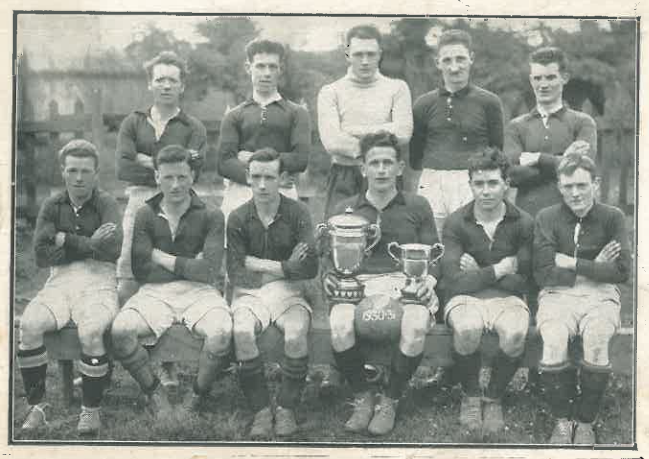
Longford Town captain Mel Deane with the Leinster Junior Cup. Pic: June 1931. Back row: J. McDonald, J. Malynn, T. O’Beirne, P. Shine, J. Dennigan. Front row: J. Breslin, J. Clarke, T. Dempsey, M. Deane, M. Gilleran, W. Clarke
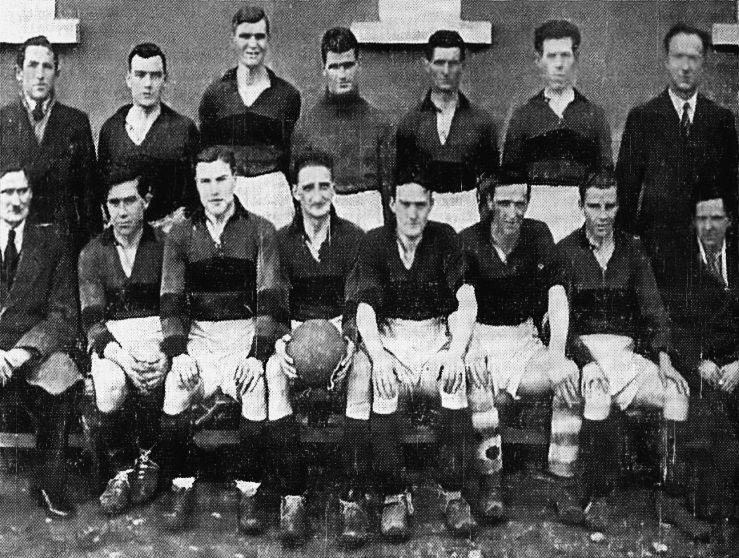
Back row: Jimmy O’Reilly, Paddy Clarke, Stephen McManus, Johnny Farrell, Jimmy Mills, Jimmy Malynn, Ger Connolly. Front row: Paddy Walshe, Mel Gilleran, Frank Giffen, Packie Shine, Willie Clarke, T. Rooney, Paddy Moran, Charlie Burke.
The success of the 1930’s era was built on a strong core of local talent supplemented with players from Athlone and Sligo. Paddy and Billy (Willie) Clarke, Mel Gilleran and Mel Deane all gave over a decade’s service to the club, while the brilliant Jimmy Clarke had his footballing career cut short by injury.
The impact of the Second World War saw the breakup of the Town side and the growth of local rivals, Longford Celtic. In the post war era, Longford Town struggled for identity and Celtic became the dominant force in Longford football. It would be into the 1950’s before Longford Town would be back competing towards the top level of Leinster and National Intermediate and Senior football.
The Second Golden Age
The 1950’s began with a Metropolitan Cup win in 1951, and over the course of the next twenty years, Longford Town F.C would amass another four Intermediate Cup wins as well as a further three Metropolitan Cup victories. During the period the perennial debate regarding local players versus talent brought in from elsewhere was always to the fore.
1960 saw Longford complete the Intermediate and Metropolitan Cup double, a feat they repeated in 1962 with locals Frankie Flaherty, Michael McKeon, Mel Mulligan and Willie Jordan as part of the squad.
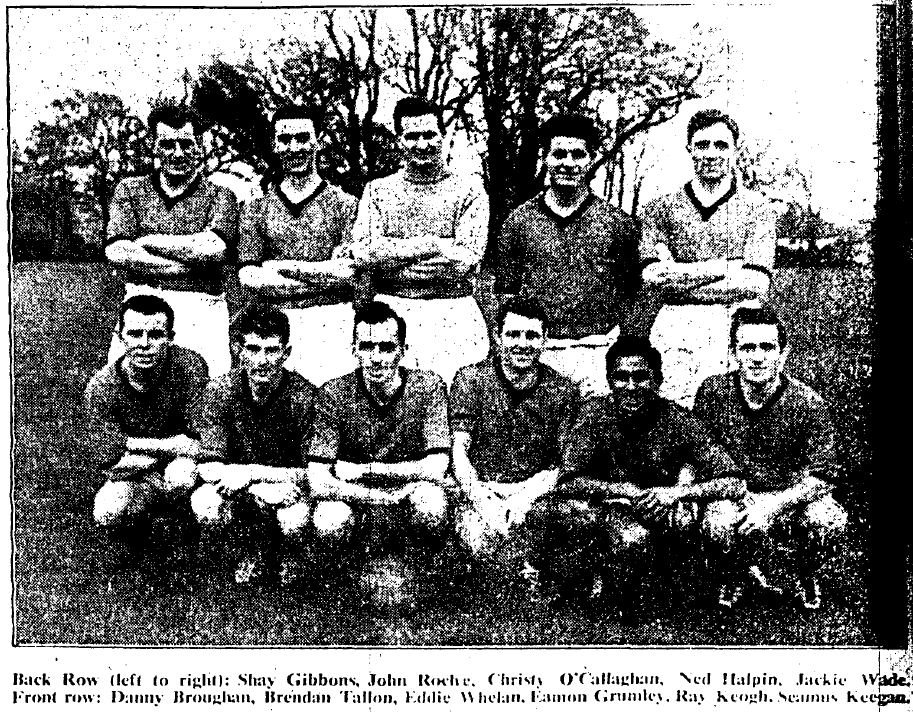
1960 Metropolitan and Intermediate Cup winners: Back row; Shay Gibbons, John Roche, Christy O’Callaghan, Ned Halpin, Jackie Wade, Front Row; Danny Broughan, Brendan Tallon, Eddie Whelan, Eamon Grumley, Ray Keogh, Seamus Keegan.
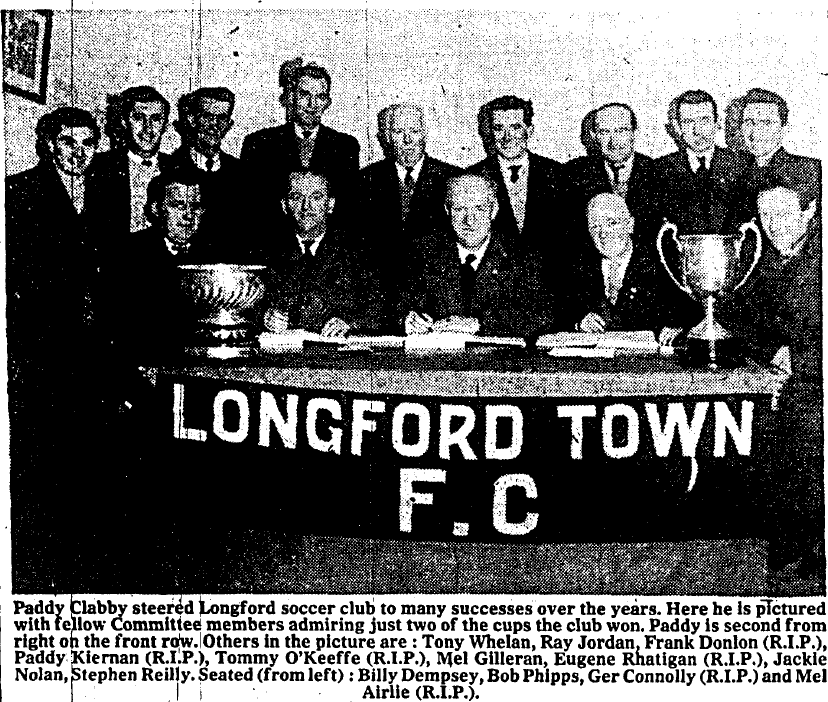
The Longford Town Committee admiring the two Cups (1962). Included are Noel Whelan, Ray Jordan, Frank Donlon, Paddy Kiernan, Tommy O’Keeffe, Mel Gilleran, Eugene Rhatigan, Jackie Nolan, Stephen Reilly, Billy Dempsey, Bob Phipps, Ger Connolly, Paddy Clabby and Mel Airlie.
Struggling financially with the burden of trips to Dublin every second week and having to pay players, Longford withdrew from the Leinster Senior League in 1966, only to return two years later. Our final win in the Intermediate Cup came in 1969, a year that also featured a famous 2 – 0 F.A.I Cup win over Sligo Rovers in Longford Park.
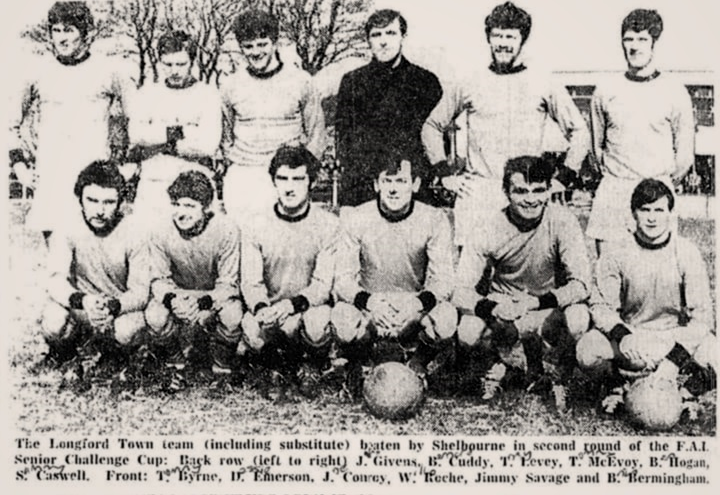
The Longford Town, March 1969. Back row: John Givens, Bernard Cuddy, Tony Levey, Tommy McEvoy, Ben Hogan, Sammy Caswell. Front row: Tommy Byrne, Dessie Emerson, Joe Conroy, Willie Roche, Jimmy Savage, Brian Bermingham.
Promotion to the League of Ireland
The 1970’s didn’t start well for Longford Town with the club falling out of Senior football (1972) and having been removed from their long-term home at Longford Park (1973). On their return to the Leinster Senior League, the club’s focus became firmly set on securing a place in the League of Ireland and establishing a home of their own. In the meantime, a temporary home became available to the club in Abbeycartron, and finally, and after a number of failed applications, Longford Town were promoted to the League of Ireland B Division for the 1980/81 season.
With a further expansion of the league planned, Longford Town found themselves promoted to the League of Ireland Premier Division for the 1984/85 season. Their first game as a fully fledged member of the League resulted on a 1 – 0 defeat to Sligo Rovers at Abbeycartron. The season as a whole would see Longford Town struggle with their new status, finishing bottom of the table and relegated to a newly introduced First Division for the following season.
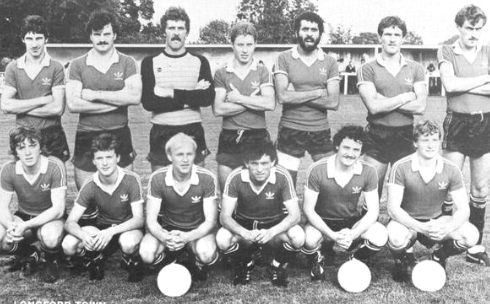
Longford Town team v’s Sligo Rovers in the League Cup 1984: Back row: Phil Wilkins, Mick Sheridan, Jim Finnerty, Declan Farrell, Heysham El Khershi, Anto Hyde, Colin Duff. Front row: Paul Reynolds, Mark Devlin, Joe Murphy, Jim Mahon, Zac Hackett, Gerard Sheridan
Over the course of the next fifteen years Longford would remain a First Division team. For the most part of this period they battled to avoid the bottom two places and the need to apply for re-election. There were highlights during this period too. In the 1986 First Division Shield final, Longford were beaten over two legs by Derry City in the final. While in 1988, the Town made it all the way to the Semi-final of the F.A.I Cup where once again they came up short against a strong Derry City side over two legs. The Longford team of this period featured local talent including club captain and occasional club manager Zac Hackett, Mark and Leo Devlin, and dual code star Dessie Barry. The period also saw the club move from their temporary home in Abbeycartron to their new fully owned facility on the Strokestown Road.
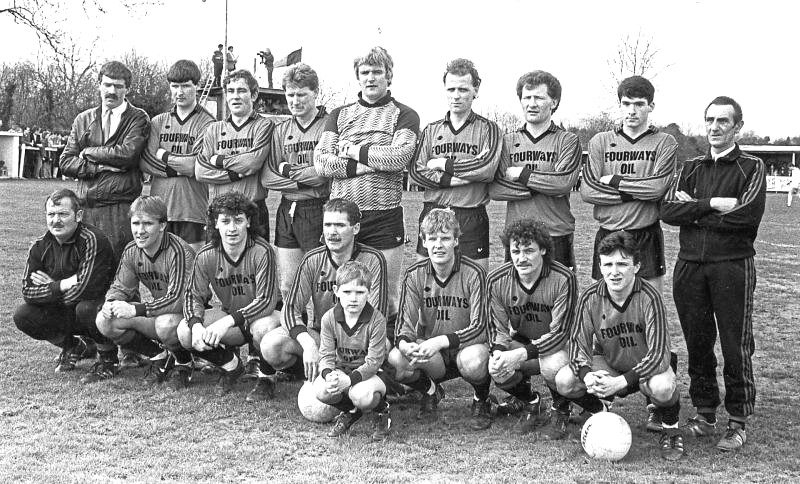
Longford Town team V Newcastlewest, April 1988. Back Row: Padraig Igoe (Assistant Manager), Paul Dempsey, Christy Thompson, Micko McCormack, Jude Quigley, Gavin Drummond, Dessie Barry, Eamon Galvin, Mickey Reilly (Medic). Front Row: Jude McGrath (Medic), Michael Malone, Johnny Morris-Burke, Gerry Quigley, Vincent Dervan (Mascot), Clive O’Neill, Pat Hackett, Leo Devlin.
The Kenny – Mathews era
Though Longford Town briefly threatened a promotion run during 1993, it wasn’t until the arrival of new Manager Stephen Kenny in 1998 that Longford would begin the process of extricating themselves from the confines of the First Division. That process culminated in promotion in 2000 and was the start of the most successful period in the history of Longford Town F.C. In the years that followed the Town would appear in six major Cup finals with two FAI Cup wins (2003 & 2004) and one League Cup win (2004). While Kenny had undoubtedly laid the foundations, the trophies were all secured under the tenure of Alan Mathews.
During this period Longford Town also made three appearances in European Competition with visits to Bulgaria, Liechtenstein and Wales forming part of the adventure.
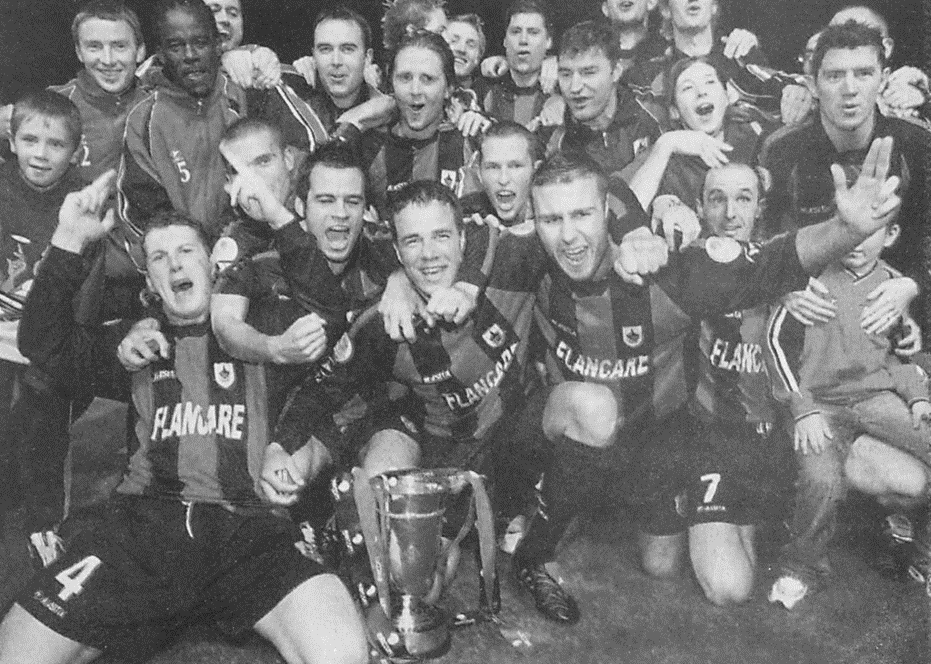
Longford Town players celebrate the 2004 League Cup victory over Bohemians.
Relegation from the Premier Division in 2007 saw the club ender a period of flux. Further promotions were secured in 2014 and 2020 but stays in the Premier Division would be brief on both occasions. As the club approached it’s Centenary, it was in a phase of rebuilding in preparation for the next phase of success.

